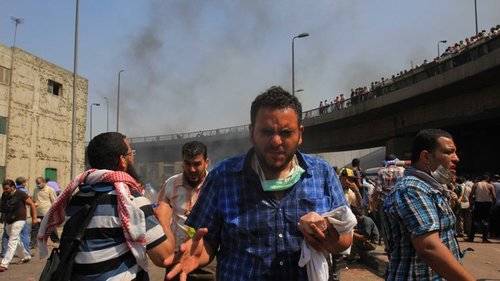The death toll in Egypt continues to rise after security forces stormed protest sites in Cairo and clashed with supporters of deposed president Mohamed Morsi elsewhere in the country.
A curfew was imposed in 14 provinces across the country on Wednesday, along with a month-long state of emergency.
The death toll continued to rise throughout the day, with Morsi's Muslim Brotherhood saying the actual number of dead was much higher than the number reported by the Health Ministry.
Thousands of Morsi's supporters had been camped at two major sites in Cairo since before he was toppled by the army on July 3, and had vowed not leave the streets until he was returned to power.
Sniper fire
Security forces moved in on the camps early in the morning, firing bird shots and tear gas. Snipers fired on the square from surrounding buildings while helicopters hovered overhead and armoured bulldozers ploughed over the protesters' makeshift defences.
Masked police tore down tents and set them ablaze.
"They smashed through our walls. Police and soldiers, they fired tear gas at children," said Saleh Abdulaziz, 39, a secondary school teacher clutching a bleeding wound on his head.
Police took full control of the Rabaa al-Adawiya camp on Wednesday afternoon, the state news agency reported.
Al Jazeera's Jane Ferguson, said smaller groups had been congregating in squares and streets after the protest camp was cleared out.
"Just because they're leaving Rabaa Square doesn't mean that they're leaving protests altogether," she said.
Earlier in the day, security forces took control of Nahda Square, the smaller of the two sit-ins, using tear gas and bird shots.
Violence spread beyond Cairo, with deadly clashes in the cities of Alexandria, Fayoum and Suez.
'Spread of anarchy'
Egypt's army-backed interim prime minister defended the government's decision to order the crushing of the protest camps, saying the authorities had no choice but to act.
"We found that matters had reached a point that no self-respecting state could accept," Hazem el-Beblawi said, citing what he described as "the spread of anarchy and attacks on hospitals and police stations".
The curfew took effect at 9pm local time (19:00 GMT) and was set to last until 6am (04:00 GMT).
In response to the violence, Mohamed ElBaradei, interim vice president and former UN diplomat, resigned, saying in a letter to the country's leadership that the conflict could have been resolved by peaceful means.
Two journalists were killed while covering the violence. Mick Deane, a cameraman for the UK-based Sky News channel, and Habiba Abd Elaziz, a reporter for the UAE-based Xpress newspaper, died from bullet wounds.
International condemnation of the violence was swift, with the US Secretary of State John Kerry calling it "deplorable".
EU foreign policy chief Catherine Ashton called on security forces to "exercise utmost restraint".
PHOTO CAPTION
Supporters of Egypt's ousted President Mohammed Morsi react to tear gas during clashes with security forces near the largest sit-in by supporters of Morsi in the eastern Nasr City district of Cairo, Egypt, Wednesday, Aug. 14, 2013.
Al-Jazeera


 Home
Home Discover Islam
Discover Islam Quran Recitations
Quran Recitations Lectures
Lectures
 Fatwa
Fatwa Articles
Articles Fiqh
Fiqh E-Books
E-Books Boys & Girls
Boys & Girls  Ramadan
Ramadan Fatwa Audios
Fatwa Audios Month of Mercy
Month of Mercy Women
Women Eed Al- Fitr
Eed Al- Fitr Food Recipes
Food Recipes Videos
Videos

 Prayer Times
Prayer Times












